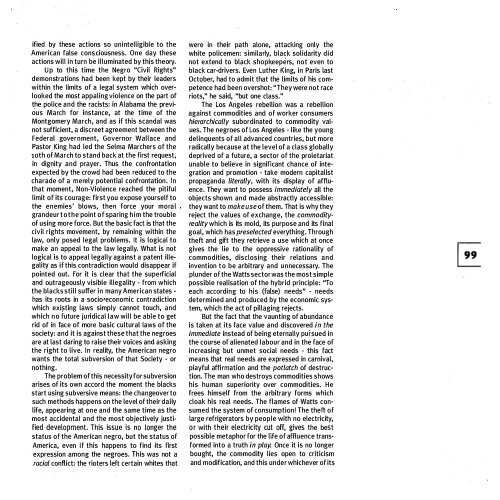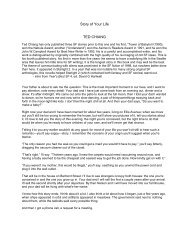SITUATIONISTS AND THE 1£CH MAY 1968
umMYFs
umMYFs
You also want an ePaper? Increase the reach of your titles
YUMPU automatically turns print PDFs into web optimized ePapers that Google loves.
ified by these actions so unintelligible to the<br />
American false cons,ciousness. One day these<br />
actions will in turn be illuminated by this theory.<br />
Up to this time the Negro "Civil Rights"<br />
demonstrations. had been kept by their leaders<br />
within the limits of a legal system which overlooked<br />
the most appaling violence on the part of<br />
the police and the racists: in Alabama the previous<br />
March for instance, at the time of the<br />
Montgomery March, and as if this scandal was<br />
not sufficient, a discreet agreement between the<br />
Federal government, Governor Wallace and<br />
Pastor King had led the Selma Marchers of the<br />
1oth of March to stand back at the first request,<br />
in dignity and prayer. Thus the confrontation<br />
expected by the crowd had been reduced to the<br />
charade of a merely potential confrontation. In<br />
that moment, Non-Violence reached the pitiful<br />
limit of its courage: first you expose yourself to<br />
the enemies' blows, then force your moral<br />
grandeur to the point of sparing him the trouble<br />
of using more force. But the basic fact is that the<br />
civil rights movement, by remaining within the<br />
law, only posed legal problems. lt is logical to<br />
make an appeal to the law legally. What is not<br />
logical is to appeal legally against a patent illegality<br />
as if this contradiction would disappear if<br />
pointed out. for it is clear that the superficial<br />
and outrageously visible illegality • from which<br />
the blacks still suffer in many American states -<br />
has its roots in a socio-ecoriomic contradiction<br />
which existing laws simply cannot touch, and<br />
which no future juridical law will be able to get<br />
rid of in face of more basic cultural laws of the<br />
society: and it is against these that the negroes<br />
are at last daring to raise their voices and. asking<br />
the right to live. In reality, the American negro<br />
wants the total subversion of that Society • or<br />
nothing.<br />
The problem of this necessity for subversion<br />
arises of its own accord the moment the blacks<br />
start using subversive means: the changeover to<br />
such methods happens on the level of their daily<br />
life, appearing at one and the same time as the<br />
most accidental and the most objectively justi·<br />
fied development. This issue is no longer the<br />
status of the American negro, but the status of<br />
America, even if this happens to find its first<br />
expression among the negroes. This was not a<br />
racial conflict: the rioters left certain whites that<br />
were in their path alone, attacking only the<br />
white policemen: similarly, black solidarity did<br />
not extend to black shopkeepers, not even to<br />
black car-drivers. Even Luther King, in Paris last<br />
October, had to admit that the limits of his competence<br />
had been overshot: "They were not race<br />
riots," he said, "but one class."<br />
The Los Angeles rebellion was a rebellion<br />
against commodities and of worker consumers<br />
hierarchically subordinated to commodity values.<br />
The negroes of Los Angeles • like the young<br />
delinquents of all advanced countries, but more<br />
radically because at the level of a class globally<br />
deprived of a future, a sector of the proletariat<br />
unable to believe in significant chance of inte·<br />
gration and promotion • take modern capitalist<br />
propaganda literally, with its display of affluence.<br />
They want to possess immediately all the<br />
objects shown and made abstractly accessible:<br />
they want to make use of them. That is why they<br />
reject the values of exchange, the commodityreality<br />
which is its mold, its purpose and its final<br />
goal, which has prese/ected everything. Through<br />
theft and gift they retrieve a use which at once<br />
gives the lie to ·the oppressive rationality of<br />
commodities, disclosing their relations and<br />
invention to be arbitrary and unnecessary. The<br />
plunder of the Watts sector was the most simple<br />
possible realisation of the hybrid principle: "To<br />
each according to his (false) needs" • needs<br />
determined and produced by the economic sys·<br />
tem, which the act of pillaging rejects.<br />
But the fact that the vaunting of abundance<br />
is taken at its face value and discovered in the<br />
immediate instead of being eternally pursued in<br />
the course of alienated labour and in the face of<br />
increasing but unmet social needs • this fact<br />
means that real needs are expressed in carnival,<br />
playful affirmation and the potlatch of destruc·<br />
tion. The man who destroys commodities shows<br />
his human superiority over commodities. He<br />
frees himself from the arbitrary forms which<br />
cloak his real needs. The flames of Watts con·<br />
sumed the system of consumption! The theft of<br />
large refrigerators by people with no electricity,<br />
or with their electricity cut off, gives the best<br />
possible metaphor for the life of affluence transformed<br />
into a truth in play. Once it is no longer<br />
bought, the commodity lies open to criticism<br />
and modification, and this under whichever of its










